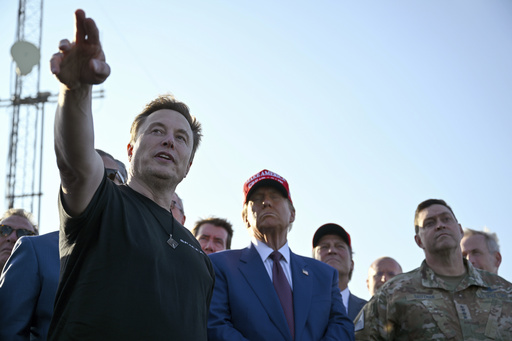
Elon Musk’s Role in Trump’s Administration Faces Scrutiny
Federal Agencies Undergoing Change
In a notable turn of events following his re-election, Donald Trump appointed Elon Musk to oversee efforts aimed at enhancing government efficiency. Musk had previously declared that his approach would be transparent, suggesting a commitment to openness, possibly through live-streaming processes.
However, in the weeks following Trump’s return to office, there has been less public insight into Musk’s operations. Quickly becoming ingrained within federal agencies, he has largely avoided inquiries from the media or engagement in legislative hearings. Employees from his newly formed Department of Government Efficiency (DOGE) have reportedly begun sidelining traditional career officials throughout Washington.
This situation presents a significant challenge not only to the regular functioning of the federal government, which Trump aimed to disrupt during his campaign, but it also raises concerns regarding essential democratic ideals like consensus and transparency. Musk characterizes his role as “White House tech support,” embedding himself deeply within an unconventional administration with seemingly limitless power.
Concerns Over Secrecy and Accountability
Donald K. Sherman, the executive director of Citizens for Responsibility and Ethics in Washington, expressed concern over Musk’s unprecedented level of power and influence, pointing out the secrecy surrounding his actions and lack of accountability.
Despite the claims from the White House that DOGE is operating with high levels of transparency—citing actions like the cancellation of underutilized contracts—critics argue that much remains concealed. Trump, in a recent Fox News interview, championed Musk as “terrific” and hinted at plans for DOGE’s upcoming focus on the large and complex Department of Defense.
When pressed about the need for Musk to address inquiries regarding his initiatives, Trump assured that Musk is more than capable of handling such responsibilities, referencing Musk’s active social media presence that showcases his thoughts freely.
Musk’s Vision for Reform
With his grand ambitions, Musk has brought a bold approach to governance, frequently making statements about the dire need to rectify federal deficits, curb government expenditures, and diminish progressive policies. He emphasized the critical nature of the moment for sweeping reforms, highlighting the pressing need for immediate action.
Musk has established himself as a force to be reckoned with, having successfully navigated numerous industries—including founding PayPal, leading Tesla, and spearheading SpaceX. His management of Twitter, now rebranded as X, also reflects a methodology of rapid change and reorganization.
However, his strategy involving the federal government has raised eyebrows due to the lack of clarity about his plans, particularly concerning access to sensitive payment systems. Much of DOGE’s work occurs under the radar, with team members infiltrating various departments like the Department of Veterans Affairs, FEMA, and NOAA without official announcements.
Members of the federal workforce have shared concerns over the actions of DOGE employees, who often appear to operate independently from existing protocols. Reports have indicated that they are setting up in ad-hoc environments, even within restricted rooms at the Education Department. A federal employees union leader voiced apprehension regarding the level of access Musk’s team has and the motivation behind it, calling the realm of transparency “alarming.”
Public Reactions and Future Outlook
While established employees express unease about their job security, DOGE staff members seem to display a carefree attitude, further exacerbating workplace tensions. Rumors occasionally arise regarding Musk’s presence at various events, although he has primarily remained situated at the White House.
Allies within the administration, like David Sacks, have commented on the youthful and energetic nature of the DOGE team, likening them to innovative management consultants. The work culture appears markedly different from traditional governmental norms, leading to confusion among existing personnel.
Some of these younger professionals hail from Musk’s previous ventures, and he has emphasized a staunch commitment to protecting their privacy. In a somewhat controversial move, the interim U.S. attorney has warned against any forms of disclosure that could be interpreted as hostile to DOGE’s mission.
Energy Secretary Chris Wright defended DOGE’s actions as proactive reforming initiatives, suggesting that this approach would usher in much-needed evaluations of existing governmental mechanisms.
As the dynamics within the Trump administration unfold, questions surrounding Musk’s formal oath, potential conflicts of interest—especially regarding Pentagon contracts—and his relationships with congressional figures remain pressing concerns. Attempts by Democratic lawmakers to summon Musk to testify have been thwarted, raising further doubts about accountability mechanisms surrounding his role.
In the eyes of some, Musk’s deep entrenchment in governmental operations without electoral endorsement demonstrates a precarious precedent for political oversight—a sentiment reflected in criticisms surrounding his influence and the implications it holds for federal reforms moving forward.

